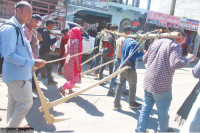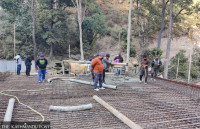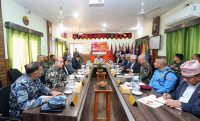National
Rana suspended as ruling parties move a proposal to impeach him
As many as 98 lawmakers of Nepali Congress, Maoist Centre and CPN (Unified Socialist) register a motion to impeach Cholendra Shumsher Rana amid a fluid political situation.
Tika R Pradhan
Just as it looked like a breakdown threat was looming large over the ruling coalition amid sharp divisions over whether to ratify an American grant through Parliament, three alliance partners on Sunday united to file an impeachment motion against the embattled Chief Justice Cholendra Shumsher Rana, a sudden move that may lead to more political chaos.
Gopal Nath Yogi, secretary at the Parliament Secretariat, said as many as 98 lawmakers from the Nepali Congress, the Communist Party of Nepal (Maoist Centre) and the CPN (Unified Socialist) registered on Sunday morning the impeachment motion against Rana, who has been in the eye of the storm since at least October last year, citing Article 101 (2) of the constitution.
Article 101 (2) states that one fourth members of Parliament can register an impeachment motion against any official holding a constitutional position on the ground of failing to perform duty effectively or working against the constitution or seriously violating their code of conduct.
The main opposition CPN-UML was quick to react, calling the registration of the impeachment motion a “guerilla-style” move aimed at sabotaging the upcoming local elections and influencing pending court cases including one related to corruption involving Madhav Nepal and Baburam Bhattarai. Both Nepal and Bhattarai, former prime ministers, are partners in the ruling coalition.
The ruling parties have argued that impeaching Rana had become imperative as the judiciary needed to be protected from further deterioration.
“Parliamentarians have attempted to give a constitutional way out to the crisis in the judiciary,” Law Minister Dilendra Badu told reporters after registering the motion. “Now lawmakers will use their discretion.”
“The motion was brought because justice delivery to the people was obstructed,” said Prakash Sharan Mahat, spokesperson for the Nepali Congress, following Sunday’s meeting of the party’s work execution committee. “The intention was to end the obstruction in justice delivery. Our party will continue discussions on it at the party's meetings.”
Rana, who was appointed chief justice on January 2, 2019, first became the centre of controversy in October last year after all Supreme Court justices launched a protest against him, accusing him of promoting corruption. Justices stopped hearing cases and sharing benches with him, and then on December 1 last year, the Supreme Court adopted a lottery system, stripping Rana of his authority to assign cases.
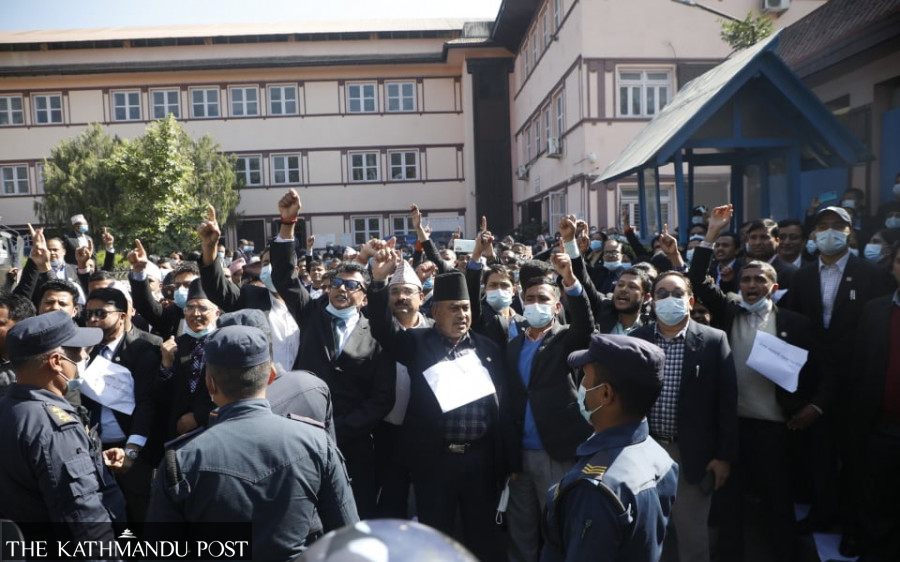
Justices returned to benches. Lawyers who had joined the protest demanding Rana's resignation continued their agitation.
Rana, however, refused to budge and instead said there is a constitutional way to oust him.
Nepali politicians dithered.
None of the parties came forward to impeach Rana, even though there were calls from constitutional and legal experts for the same.
Now the three ruling parties making a sudden move against Rana has left many wondering why they chose to do so now and not in the past.
Registration of the impeachment motion automatically resulted in Rana’s suspension, and Deepak Kumar Karki, the seniormost justice at the Supreme Court, has already taken the charge as acting chief justice.
Currently there are some crucial sub judice cases at the top court related to political parties and their leaders including the one related to Lalita Niwas land grab in which Madhav Kumar Nepal and Baburam Bhattarai have been indicted. There is also a case regarding the expulsion of 14 lawmakers by the UML including Nepal.
Some of the cases need to be heard by the Constitutional Bench, which was not able to sit because justices were not sharing the bench with Rana.
Now with Karki taking over, the Constitutional Bench can convene. Also, the stalled meetings of the Constitutional Council, Judicial Council and Judicial Service Commission where the chief justice is an ex-officio member can resume.
Legal and constitutional experts say the two previous impeachment motions—one against the then chief of the Commission for Investigation of the Abuse of Authority Lokman Singh Karki and the then chief justice Sushila Karki-—were intended to fulfil political interests of the parties instead of strengthening the constitution. The motive behind the impeachment motion against Rana is not clear yet, according to them.
“If the impeachment motion has been brought with a good intention, it will help bring reforms in the judiciary but if it is meant to serve partisan interests, the judiciary will suffer more,” said Bhimarjun Acharya, a constitutional expert.
Some leaders of the main opposition party have warned of registering another impeachment motion against four other justices of the Supreme Court who were involved in reinstating the House dissolved by the KP Sharma Oli-led government twice.
But experts say the possibility of the UML bringing another impeachment motion was slim as there was nothing to charge them with and to justify that.
“I don’t think the main opposition will come up with such a vindictive approach,” said Acharya. “If that happened, the judiciary would plunge into another never-ending conflict.”
Another constitutional expert, Tikaram Bhattarai also said the UML may not take such a move, which could prove counterproductive for the party, at a time when the country is heading towards elections.
He said the impeachment was the result of the ongoing struggle of the justices and Nepal Bar Association as Rana refused to abide by the suggestion of the ruling alliance to give a way out by staying on leave. “I think it’s a compulsive move of the ruling parties to bring the judiciary onto track after four major bodies– Constitutional Council, Judicial Council, Judicial Service Commission and the Supreme Court–are dysfunctional,” Bhattarai told the Post. “The move aims to ensure proper functioning of the constitution that was obstructed due to the chief justice.”
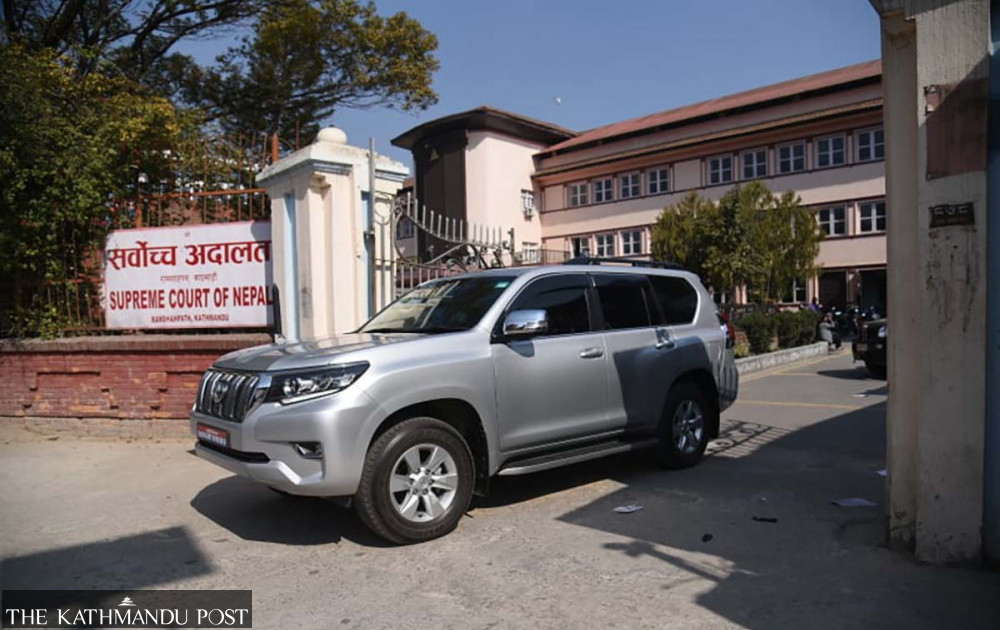
Rana is the second chief justice to face an impeachment motion. In 2017, the Maoist Centre and the Congress had registered a similar proposal against then-chief justice Sushila Karki, accusing her of interference after the Supreme Court overturned the government’s decision to appoint Jaya Bahadur Chand as Nepal Police chief. It was a single bench of Rana, who was then a justice at the Supreme Court, which had on May 5, 2017 stayed the impeachment motion, saying that “the move to impeach the chief justice is against the spirit of the Constitution of Nepal”.
Until protests emerged against Rana in October last year, he was largely hailed as a hero for protecting the constitution as the Constitutional Bench led by him had restored the House twice dissolved—on December 20, 2020 and May 21, 2021—by the Oli government.
It was the Rana-led bench that on July 12 ordered installation of the Deuba-led government after lawmakers from the Nepali Congress and the Maoist Centre and others filed a petition against Oli’s May 2021 House dissolution.
On Sunday, Dahal said that the impeachment motion against Rana “will further strengthen the ruling coalition”.
“The process was initiated after Rana refused to give a way out to the lingering deadlock in the judiciary and further escalated conflict in the legal sector,” Dahal said while speaking to reporters in Janakpur on Sunday.
In the proposal registered at the Parliament Secretariat, the lawmakers have levelled 21 charges against the chief justice including that he completely failed to strengthen the independent and competent judiciary apart from failing to protect the country’s legal sector.
“It has been proved that the chief justice had demeaned and misused his position by demanding his share as an ex-officio member of the Constitutional Council at the constitutional commissions and other commissions and had recommended the appointment of his family members and close people without devising any criteria,” the lawmakers said in their motion.
The motion was registered after a meeting between three top leaders of the ruling alliance—Deuba, Dahal and Nepal—at Baluwatar on Sunday.
Some UML leaders have said the motive behind bringing the impeachment motion at this point of time was to influence the decisions of the Supreme Court with the warning that other justices could also be impeached anytime.
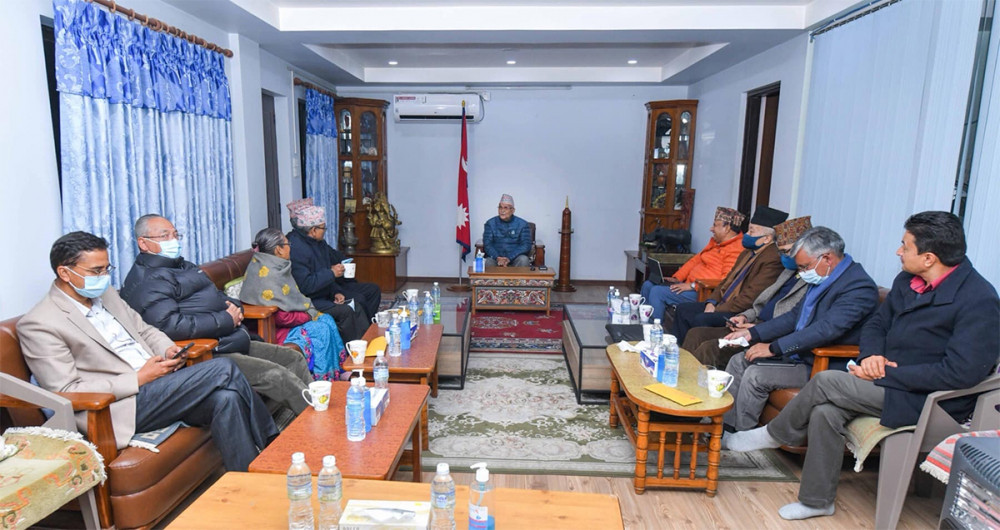
A senior justice of the Supreme Court said all the judges were shocked to hear the news about the impeachment motion. The justice said there could be many implications of the impeachment motion such as serving the interests of the ruling parties in the case of 14 lawmakers including Madhav Nepal expelled by the UML as they want the court to stop the MCC compact besides annulling the constitutional appointments made by the Oli government. “We are worried as this move could inflict more political intervention on the judiciary,” said the justice. “There are media reports saying more impeachment motions could be registered which will further harm the already damaged judiciary.”
Former chief justice Anup Raj Sharma also expressed concern over the possible decision of the UML to impeach more justices as that could create a mess in the judiciary. “It would be better if Rana resigned as he could create more mess if he returned to the Supreme Court,” said Sharma. “The picture is not clear yet.”
He said the registration of impeachment motions against two chief justices seriously damaged the image of the judiciary.
A senior UML leader said their Parliamentary Party meeting scheduled for Monday morning could take a decision on whether to bring another impeachment motion but he didn’t elaborate whether that would be against four justices of the Supreme Court who were involved in reinstating the House last year. UML leaders have been saying that impeachment motion should be registered against the four other justices instead of the chief justice.
“We have entrusted our Parliamentary Party to take necessary decisions,” said Shankar Pokhrel, general secretary of the party following the Secretariat meeting at Oli’s residence in Balkot. “We have decided to seriously counter the move of the ruling coalition.”




 13.03°C Kathmandu
13.03°C Kathmandu


